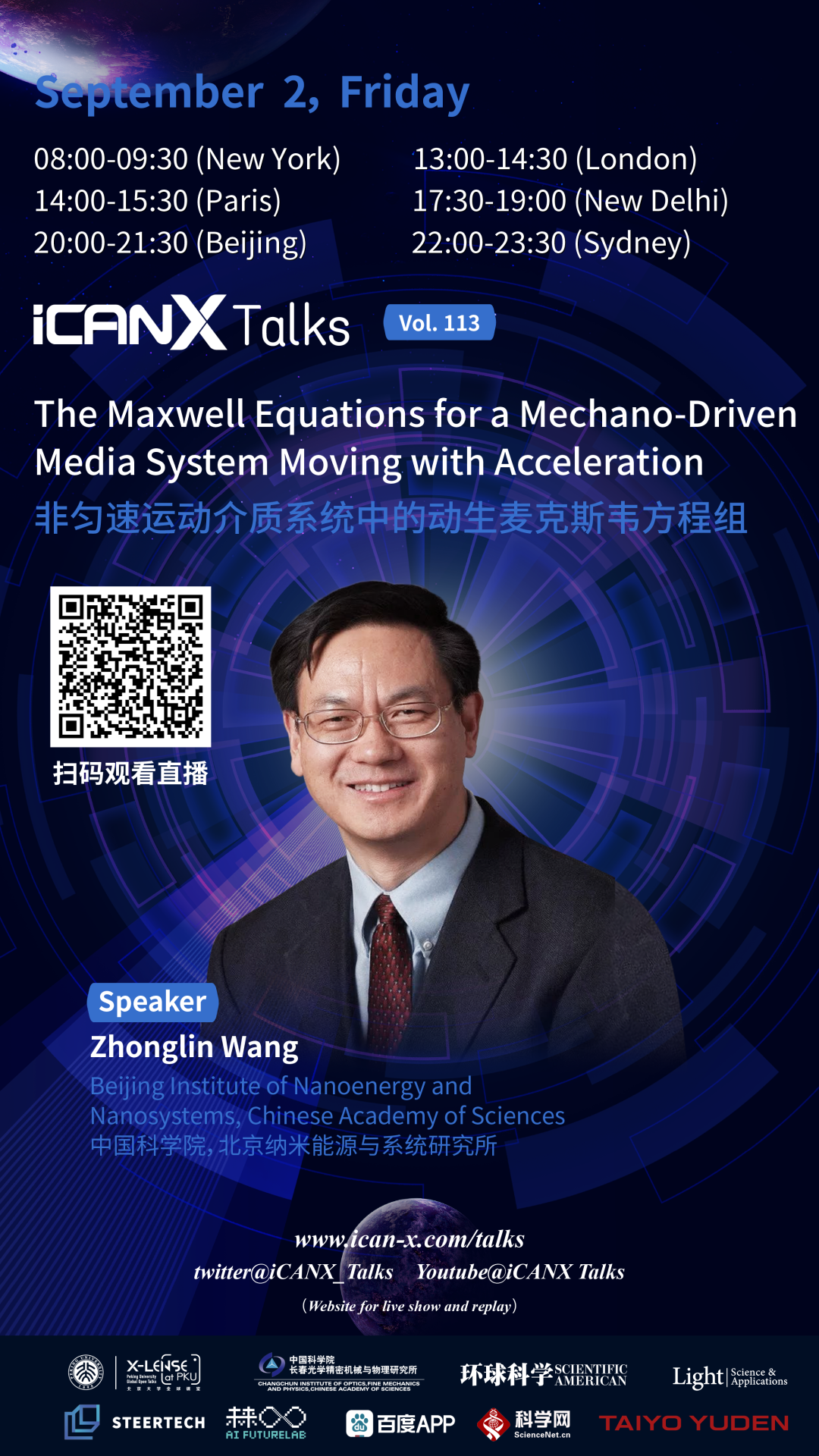[Lecture] the Maxwell Equations for a Mechano-Driven Media System Moving with Acceleration
Sep. 02, 2022
Speaker: Zhonglin Wang, Beijing Institute of Nanoenergy and Nanosystems, Chinese Academy of Sciences
Time: 20:00 pm, September 2, 2022, GMT+8
Venue: iCANX Talks platform
Long press to identify the QR code and jump to the webpage!
Abstract:
We first invented the triboelectric nanogenerator (TENG) in 2012. Its application involves many fields, such as micro-nano energy, self-driven sensing, medical and health, environmental protection and detection, wearable and flexible electronic devices, security technology, etc. The principle of triboelectric nanogenerator is to convert mechanical work into electrical work based on the displacement current generated by the relative motion of the medium. When the frequency of motion becomes higher, there is "electromagnetic radiation generated by motion". In order to describe the development of these future sciences, we deduce the Maxwell equations for mechano-driven slow- moving media. For the first time, the Ps term is added to the electric displacement vector D, which represents the polarization term introduced by the surface charge generated by the mechanical movement, and the original electromagnetic transformation is introduced in Maxwell's equations to represent "moving electricity" the physical term of and its force-electricity-magnetic coupling. It is because of this term that we can deduce the electrical work output due to motion and the corresponding electromagnetic wave radiation. The extended Maxwell equations are based on two conditions: v << c; Ignore the relativistic effects due to the motion of the medium. Therefore, the newly derived equations are suitable for describing the electromagnetic phenomena observed in the laboratory coordinate system with multiple moving media in engineering. This processing is sufficient to ensure that in practical technology Accuracy and precision in application. And the propagation of electromagnetic fields radiated in space due to motion satisfies the special theory of relativity and Maxwell's equations. This report mainly introduces the derivation of the equations, the assumptions of the derivation and potential future applications.
Biography:
Academician Zhonglin Wang is Director of the Beijing Institute of Nano Energy and Systems, Chinese Academy of Sciences, Chair Professor of the University of Chinese Academy of Sciences, Dean of the School of Nanoscience and Technology, and Chair Professor of the Georgia Institute of Technology. Prof. Wang is the recipient of the 2019 Albert Einstein World Award of Science, the 2018 ENI award – The “Nobel prize” for Energy, the 2015 Thomson Reuters Citation Laureate Award, the 2014 American Physical Society James C. McGroddy Award for New Materials, and the 2011 American Materials Society Medal (MRS Medal) and other international awards. He is a foreign academician of the Chinese Academy of Sciences, an academician of the European Academy of Sciences, a foreign academician of the Canadian Academy of Engineering, and the founding and current editor-in-chief of Nano Energy (latest IF: 19.08), a well-known international journal in the field of nano-energy.
Academician Wang is the founder of the field of nano-energy research. He has developed high-entropy energy based on nano-energy and a new-era energy system; created a self-driven system based on nano-generators and the grand field of blue energy, and the third-generation semiconductor based on piezoelectric and piezoelectric optoelectronic effects. The new field of piezoelectronics, piezoelectric optoelectronics and triboelectronics was established; six new physical effects were discovered: piezoelectric effect, piezoelectric optoelectronic effect, piezoelectric photonic effect, tribovolt effect , thermoluminescence photoelectron effect and AC photovoltaic effect. Professor Wang holds hundreds of US and international patents and has incubated five companies.
Source: iCANX

